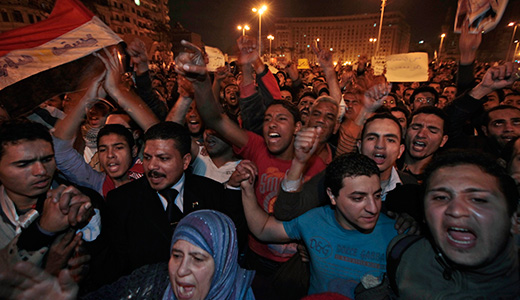
When the mass uprising in Tunisia spread to Egypt last week, it took a qualitative turn.
Unlike Tunisia, Egypt has for decades been a linchpin of U.S. policy in the Middle East.
Egypt occupies a highly strategic position, straddling Africa and Asia, and it controls the Suez Canal, the vital shipping link for oil and other products moving between Asia and Europe and beyond.
With the largest population of any Mideast country and a highly developed working class and intelligentsia, Egypt is perhaps the pre-eminent intellectual, cultural and political center for the entire region.
And since signing a separate peace pact with Israel in 1978, Egypt has been seen as a key silent partner for U.S. policy in the region. Since 1978, the U.S. has given Egypt about $60 billion in foreign aid. Of that, $35 billion has been military aid, according to the New York Times, “making Egypt the largest recipient of conventional American military and economic aid after Israel.”
Yet, as in Tunisia, economic inequality has sharpened. Add in decades of political repression and the result is an explosive mix.
While a small group has benefited from what Georgetown University political scientist Samer Shehata has described as “merciless” neoliberal economic policies pushed by the U.S., World Bank and International Monetary Fund since the 1990s, nearly half of Egyptians live at or below the poverty line, and prices have soared for basic items like bread.
Film star Omar Sharif put it this way in an interview with France Inter radio from his Cairo home: “The president [Egyptian President Hosni Mubarak] hasn’t improved the standard of living of Egyptians. There are some people that are very rich – maybe 1 percent – and the rest are all poor trying to find food.”
Shehata, interviewed about Tunisia on The Real News, said, “Tunisia was referred to as an economic miracle because of the high rates of growth – and in fact they were high rates of growth. But as many people have said, you know, average citizens don’t eat macroeconomic statistics. And this is the problem, that on paper the economies look quite good, but when you really get down to income inequality, who gets what, as it were, things look significantly different.”
The same applies to Egypt, and across the region, Shehata told American Public Radio’s Scott Tong. Egypt’s economy is growing and opening up to the free market. “Big government” – nationalized industries and public services opened by Egypt’s Gamal Abdel Nasser with Soviet support in the 1950s – is shrinking, foreign investors keep coming. But Shehata says the “vast majority” of Egyptians aren’t keeping up. Citing the young Tunisian who set himself on fire last month and died, Shehata said, “The gentleman who set all of this off, the 26-year-old high school graduate who resorted to selling fruits and vegetables in a stand, he is symptomatic of the condition of millions of people in the Arab world.”
In Egypt as in Tunisia, young people under 30 make up a growing chunk of the population, and while many are well educated they can’t find jobs.
Shehata estimates unemployment among new college graduates is 30 percent, and they are turned off by the notion of the “market economy.”
Emad Shahin, an Egyptian who is associate professor of religion, conflict and peace-building at the University of Notre Dame, wrote in the New York Times that Mubarak’s regime has “produced an army of educated, unemployed youth; and created deep social and political malaise.”
Thus we should not be surprised that young people have played a leading role in the uprising, and that the April 6th Youth Movement, formed largely through Internet social media like Facebook, has drawn diverse parts of Egyptian society into the streets.
The April 6th Youth Movement’s Facebook page features the slogan, “The people united will never be defeated.” That is a slogan associated with Chile’s Popular Unity government led by socialist Salvador Allende, crushed by a bloody U.S.-backed coup in 1973.
The movement, formed three years ago, takes its name from an April 6, 2008, general strike that itself stemmed from a year-long strike by textile workers in Ghazi el-Mahalla. Key issues in the general strike were the soaring cost of bread and other basic necessities, and demands for increased wages.
The call for the 2008 strike was issued by doctors, educators and lawyers associations, grain mill workers, and several opposition parties and movements. They said in part, “We need salaries allowing us to live, we need to work, we want our children to get education, we need human transportation means, we want hospitals to get treatment, we want medicines for our children, we need just judiciary, we want security, we want freedom and dignity, we want apartments for youth; we don’t want prices increase, we don’t want favoritism, we don’t want police in plain clothes, we don’t want torture in police stations, we don’t want corruption, we don’t want bribes, we don’t want detentions.”
The same themes and social forces, but perhaps on an even broader scale, are on the streets of Egypt today.
“What we’re seeing right now is very interesting,” Ahmad Shokr, an editor at the influential Egyptian newspaper Al-Masry Al-Youm, told Democracy Now. “We’re seeing all kinds of different groups coming out. We’re seeing workers. We’re seeing opposition political parties, who had at first been reluctant to support these protests, coming out in full force. And so, I think what we’re witnessing is a transformation from what started as a youth-led movement, a movement of Egyptian young people demanding change, to a popular uprising.”
This ideologically diverse, nonviolent movement is united around a few key demands, summarized by Shahin as: “freedom of expression and association, and an end to corruption, poverty, unemployment and Mubarak’s three decades long reign.” This is not an Islamic-led movement. Its makeup and demands should put an end to the stereotyping of Arab peoples as uniquely mired in religion.
Regardless of the immediate outcome, the mass uprising in Egypt marks a turning point not only for Egypt, but for the Middle East and surrounding countries, and for U.S. foreign policy.
Mass protests have erupted in nearby countries ruled by U.S.-backed “great leader” dictators and rulers-for-life, including Sudan and Jordan. Sooner or later, the feudal Saudi regime will undoubtedly face its own moment of truth.
Shahin and Shehata are among a growing list of scholars (currently over 100) who have signed an open letter to President Obama calling for a new U.S. foreign policy that treats Egypt and the Middle East region “through a framework of shared values and hopes, not the prism of geostrategy.”
“We urge your administration to seize this chance, turn away from the policies that brought us here, and embark on a new course toward peace, democracy and prosperity for the people of the Middle East. And we call on you to undertake a comprehensive review of U.S. foreign policy on the major grievances voiced by the democratic opposition in Egypt and all other societies of the region.”
Photo: Protesters fill Tahrir square in downtown Cairo on Sunday, Jan. 30. (AP/Lefteris Pitarakis)












Comments